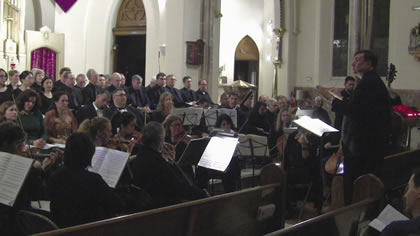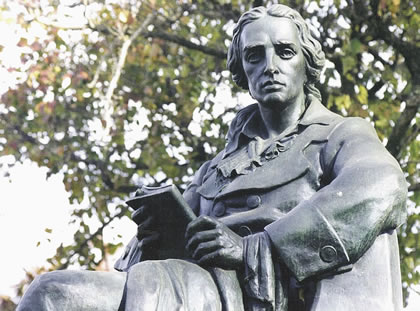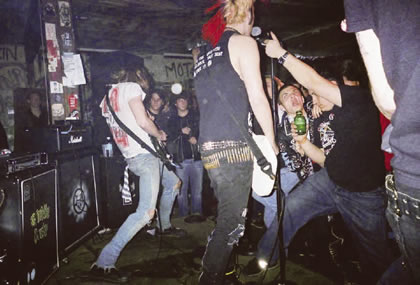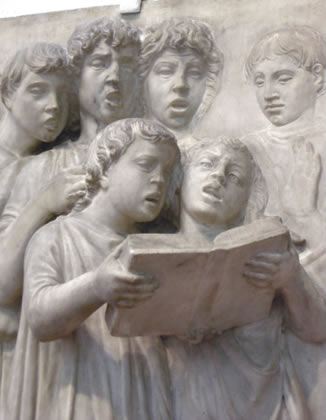Beauty Is Necessary for Mankind
March 2016
A PDF version of this article was published in the January 15, 2016 issue of Executive Intelligence Review, and is re-published here with permission.
During the January 8, 2016 LaRouche PAC Webcast, the following exchange took place, wherein the subject of creating a new Renaissance was posed.
Matthew Ogden: During our discussion earlier this afternoon with Helga Zepp-LaRouche, she emphatically stressed that there is no escape from this Dark Age, this looming Dark Age, of war and economic disintegration, short of the initiation of an entirely new paradigm for civilization, one which makes a clean break with the failed policies of the past, and literally intends to usher in a New Renaissance on the scale of what we saw with the great European Golden Renaissance of several centuries ago, but really going much, much further beyond this, to reach accomplishments that mankind has not achieved before.
That’s the kind of vision of the new paradigm, which, over the past several months and years, Helga Zepp-LaRouche has personally been touring the world discussing, and the LaRouche movement has been engaged in: not just talking about the necessity of bringing this about, but actively engaged in creating the new paradigm. . . .
The major aspect of the creation of a new paradigm, which really hinges on which way the United States goes in the coming days and months, is the active intervention of the LaRouche movement and its activists into New York City, specifically into Manhattan. The spear-point of this, which has become known as the Manhattan Project, has been a broad-based campaign for the revival of great Classical culture, specifically great Classical music in the form of choral singing. Now, this project has rapidly developed in a qualitative way, as marked by the most recent series of concerts of Handel’s Messiah, which took place over the weekend of December 19th and 20th, 2015. These two concerts were co-sponsored by the Schiller Institute Community Chorus and the Foundation for the Revival of Classical Culture.
The first of these concerts was in Brooklyn on December 19, 2015, and the second, the following day in Manhattan at the Unitarian Church of All Souls on the Upper East Side. The full video recordings of both of these concerts now are available on YouTube, and we encourage you to watch them if you have not already done so, and absolutely to circulate them as widely as you can. It’s one of the greatest gifts you can give to your friends and relatives; but what we’re going to do right now is to treat you to a few clips from the second of those concerts, the Manhattan performance, as a prelude to the remarks that Megan Beets is going to make in the next segment of our webcast here tonight.
The Messiah Performances
Excerpts were then played from the Manhattan concert, including “For Unto Us a Child Is Born,” “Surely He Hath Borne Our Griefs,” and the “Hallelujah!” chorus.
 View full size Schiller Institute
John Sigerson conducting the Schiller Institute chorus at the Dec. 19, 2015 performance of Handel’s Messiah at the Sacred Hearts & St. Stephen Roman Catholic Church in Brooklyn. |
Megan Beets: What you just got a taste of, is the leading and most essential edge of our political movement’s intervention into the United States at this time. It represents the fruits of roughly one year of intense work of building the Schiller Institute New York Community Chorus, which is formed of some professionals and semi-professionals, but mostly amateurs, political organizers, political supporters of the LaRouche movement and others, who joined the chorus, many of whom had no prior musical experience.
This chorus is singing at the scientifically correct tuning of “A” at 432—lower than most choruses and orchestras around the world—and its members are trained or are training in the Classical tradition of the Italian Bel Canto school. What you just saw and heard, represents a year of intense work, intense dedication; the commitment of long hours on the part of the organizers of the chorus; and the commitment of resources in many forms—financial, time resources, and so forth.
Now, given the picture of the world strategic situation that Jeff just presented, and given the fact that this movement—upon which and upon whose leadership the fate of the United States, and really the world, depends—is rather small and limited in resources, one could ask, “Shouldn’t we direct our very limited resources somewhere else, somewhere more precisely focused on the fight at hand? Shouldn’t we send more people to Congress? Shouldn’t we not waste our resources on something so impractical, and so indirectly related to the timely fight at hand?” No.
Nothing Practical Will Help
It’s precisely in the fact that the formation and activity of the chorus is not practical that you get a taste of where the victory lies. Nothing “practical” can change the United States at this point, and it’s not just the fact that Classical music and this chorus is not practical. That’s not the important point. The point is that it’s beautiful; beauty, beautiful culture, is not a luxury for mankind. It’s a necessary and essential condition for humanity, and in fact, it’s the only way in which we can change the country and have a possibility of winning this political fight.
I want people to just think for a second; look around you, think about the culture today, the popular culture. The popular culture of the West especially has become so degraded, so depraved. Over the course of the Twentieth Century, the culture has become, step by step, worse and worse. There’s nothing human left. There’s nothing universal left in film, in drama, in the popular music. And in that, I’m also including the popular expressions of so-called Classical music.
Ugliness, Emptiness, and Frivolity
The culture today celebrates ugliness, sex, banality, emptiness, and frivolity. It glorifies the worst and most low and empty tendencies in man. All of those characteristics of the popular culture have dulled the sensibilities, and the sensitivities, of people in our society to be able to be moved by high, new, and beautiful important ideas.
Now that really gets to the essential point. We’re not in this political civilizational crisis because of a lack of knowing what to do. The solutions are there. The options are there. We have identified exactly what steps must be taken, and they will work. The political power to put them into effect is there. What’s lacking is the will and morality in the culture to make it happen.
This is the essential question: How do we reawaken that will, and that morality, within society? How do you restore to a people a sense of their humanity?
So, here, I’d like to bring in some thoughts from the work of somebody who hardly any Americans are familiar with, and that is the great poet of freedom, Friedrich Schiller, who was German, and who lived at the very end of the Eighteenth and beginning of the Nineteenth Centuries. Schiller lived during a very tumultuous time politically. In 1794, he authored a series of letters which address very precisely, and also very scientifically, exactly this question at hand.
This was right about the time that Schiller watched, with great horror, the collapse of the French Revolution, which had held so much hope and potential for the continuation of the American Revolution, and the political freedom of Europe, and then all the world. Schiller saw it collapse into brutality and violence, and eventually it collapsed into fascism, under the rule of Napoleon. And in response to that, Schiller said, “A great moment has found a little people.”
Ennobling a Degraded People
What he presents in these letters, from which I’d like to read a couple of short excerpts, is that the only means of freeing mankind from the kind of tragedy that was witnessed in the French Revolution, and in many prior attempts—and in the situation we find ourselves in today—the only means of freeing mankind is nothing practical, nothing currently existing within mankind, within society. You have to create a new potential within mankind. And Schiller said the only way to do this, is through beautiful art.

pinehurst19475
A statue of the Poet of Freedom Friedrich Schiller in Belle Isle, Detroit, Michigan. It was erected in 1908. |
I’d like to read short excerpts, and I’m going to begin with a passage where Schiller identifies exactly what I just identified a couple of minutes ago: that the problem is not a lack of knowledge. He says: “From whence arises this still so universal predominance of prejudices, and this darkness of thought, with all the light which philosophy and experience have shed on it? The age is enlightened; that is to say, knowledge has been discovered and made public, which would suffice to at least rectify our practical principles. The spirit of free inquiry has dispelled the erroneous conceptions which blocked the access to truth for a long time, and reason has purified itself of the illusions of the senses, and deceitful sophistry. So why is it that we are still barbarians?”
To that, Schiller says: “You must dare to be wise. Energetic courage is needed to overcome the obstacles which the inertia of nature and of cowardice of heart place in opposition to our enlightenment. It is significant that the ancient myth has the goddess of wisdom emerge fully armed from Jupiter’s head. For her first action is warlike.”
Then Schiller warns: “But, people would already have to be wise in order to love wisdom. Therefore it is not enough to conclude that any enlightenment of the understanding only deserves our respect insofar as it affects the character in turn. To a certain extent, it must proceed from the character, because the way to the head must be opened by the heart. The development of the capacity for feeling is the more urgent need of our age: not only because it will be a means of making improved insights effective for practical life, but for the very reason that it awakens this improvement of insight.”
But How?
Now, how do we accomplish this? How do we develop within a population a disgust for depravity, and a true ennoblement of the capacity for feeling?
Schiller says that the tool to do this is art, is beautiful art. He says: “Art, like science, is free from everything that is practical and is established by human convention, and both rejoice in an absolute immunity from human lawlessness. The political legislator can enclose their territory, but he cannot govern within it. He can outlaw a friend of truth, but the truth exists. He can humiliate the artist, but he cannot degrade art.”
So, then, how do you win over a degraded people, or even an underdeveloped, undeveloped people, to choose reason? He says: “People’s taste is purely in their hearts. In vain you will assail their maxims. In vain you will condemn their deeds. But you can try your fashioning hand on their idleness. Drive away lawlessness, frivolity, and brutality from their entertainment, and you will imperceptibly banish it from their actions, and finally, from their character. Where you find them, surround them with noble, great, and ingenious forms. Place the symbols of excellence all around them until reality is overcome by appearance, and nature is overcome by art.”
Now Schiller makes the point more precisely a little bit later in the series of letters, that in order to capture truth, you have to venture out beyond what he calls reality, beyond what currently exists. And you have to venture out into the imagination to capture something which is true. And that’s really the purpose of great art: to remove from mankind the limitations and the imperfections which he currently suffers, even if it’s only for the short duration of the performance or viewing of the piece of art. And during that segment of time, during the experience and the process of participating in beautiful culture and beautiful art, man’s emotions, man’s passions and desires, can be brought into coherence with reason, with what is true, what is just, and what is good.
What Was the Secret in Manhattan?
That is the task and the power of art: to elevate mankind as much as possible to the ideal. And to put him into a condition where his impulses, his free will, and the laws of man are so ennobled that they can be relied upon as a force of nature. Now, with that in mind, return to the concert that you saw a glimpse of at the beginning.
 www.rockhellradio.com How can today’s culture of ugliness and degradation be replaced? |
The day after the concert, on Monday, Dec. 21, during the Policy Committee show, Mr. LaRouche responded to what had happened in Manhattan; he said: “What happened in these concerts was something which was music, but it was not just music per se. It’s the way that the human mind functions competently. It was a process which gave over 1,000 people—who participated both in the audience and as musicians—it gave them an experience of a resonance with the human mind.” That’s art; that’s the purpose of art. To develop, to experience, and to celebrate that capacity of true creativity in mankind.
Now, given that, it’s no wonder that if we look back in history, we see that in great periods of political progress and political development for mankind, we’ve always had the companion of the development of great art. We saw that in the Golden Renaissance of Italy, where simultaneously we had the development of the beginnings of the sovereign nation-state, and the developments in poetry and art and singing. It’s no wonder that Mozart was a stern supporter of the American Revolution; Beethoven likewise. It’s no surprise that Giuseppe Verdi was a supporter of the movement for sovereignty in Italy, and also served in the Italian Senate. That Johannes Brahms was a great supporter of Bismarck, who was the bastion against the takeover of Europe by the British Empire. And it’s no wonder that even from a young age, Lyndon LaRouche has understood and taken great pleasure and joy in, and promoted the restoration and the renaissance of Classical art.
Now, return in your mind to what Jeff laid out, to the great political crisis at hand, and the task ahead of us in the short term, which is to oppose the great evil which has taken over the planet—that is, the British Empire and its stooge in the person of Barack Obama. As Mr. LaRouche said, we have gained a foothold against that evil with what was done in Manhattan. And I’d like to end by both challenging and also inviting all of you to take up the full scope of that fight against evil.
We’re not going to win part of the battle; this is not a fight for an issue. If you fight for an issue, we will lose. Ironically, the only fight that can be won at this point is the big one, is the whole fight, the fight for a completely new paradigm. Fight for a new, uplifted ennobled state of mankind, in which man is taking a great step forward toward fulfilling his ideal and his true potential. And if you’re in the New York area, you can start by joining the chorus.
Join the Chorus!

creative commons/sailko
Classical beauty in music and sculpture, as conveyed in one of the many bas reliefs on the choir lofts by Luca della Robbia in Brunelleschi’s Florence cathedral. |
At the LaRouche PAC Jan. 9th Manhattan Town Hall Meeting, John Sigerson, the conductor of the Schiller Institute New York Community Chorus, delivered the following remarks, partially in response to what Megan Beets had said the previous day concerning the continuing work of that chorus.
John Sigerson: It would be a big mistake to think that the choral work, the chorus, is some kind of soft way of getting people into the hard core of the LaRouche movement, or something like that. That would be a stupid way of looking at it, and I think that if anybody had any doubts about that, they should simply watch the video of the two concerts that we did on Dec. 19th and 20th. How many people were at the concert or have heard it? Those of you who haven’t, please, get on the website and watch this.
I was lucky enough last night, to listen to part of the webcast that was done by Jeff Steinberg and Megan Beets, which is on the LaRouchePAC website also, and in which, after a very powerful presentation by Jeff, Megan Beets gets up and gives just as powerful a presentation of the significance of what was done on Dec. 19th and 20th. And frankly, even though I was the conductor of these events, I was very surprised at seeing what we accomplished.
Handel’s Messiah is performed probably more frequently than any other work. But nevertheless, the response that we got with these two concerts was something quite remarkable. And I think it’s useful for everyone to consider exactly what it was that created that kind of effect.
Bringing People to a Higher Plane
I think it’s very similar to the effect that Brunelleschi had when he created the famous dome on the Cathedral of Santa Maria del Fiore in Florence, Italy. It’s a question of continuous curvature. That is, I don’t know how many of you have heard many performances of Handel’s Messiah; it’s done all the time. It’s done terribly, in my view, most of the time. With great gusto! So that I don’t think it was the gusto that was what moved the audience.
It’s not that. It was this question of the curvature, which is that, even though we weren’t saying anything explicitly about all of the things that were discussed here today, it was informed by all of those things. And the being informed, is what created that kind of curvature for everyone, in exactly the way that Friedrich Schiller describes in his Aesthetical Letters. It brings people in a way that they don’t even understand, onto a higher plane. And I think everybody felt that.
Now, how did we do it? Interesting question. And how can it be done? Well, part of it has to do with Lyndon LaRouche and his influence on me personally and the people we’ve been working with. I spent many an hour, and continue to do so, comparing the performances by the greatest conductor and creative musician of the Twentieth Century, Wilhelm Furtwängler, to other recordings. He died when I was three years old, so I didn’t have a chance to hear him live. I’ve pondered, over and over again, what’s the difference between what Furtwängler was able to do with audiences, and with performances, and what virtually everyone else has done. I would say that other performances have flashes of what Furtwängler does, but there is that “certain something” that Furtwängler was able to sustain; and I’ve dedicated my life to being able to create that “certain something.”
And that’s exactly what organizing people is all about as well, in terms of changing their ways of thinking, by changes in curvature of thought, in ways that they may not even perceive, initially. And things grow and grow and grow. And I think that’s exactly what we’re doing with the chorus right now. And we hope to continue it. The chorus should also grow, and grow, and grow.
So, if you haven’t joined, join! And if you have joined, I think it would be good for you to take out any old recording you’ve got of the Messiah and compare it to what we did. And think for yourselves, exactly what was that difference? See if you can put your finger on it.
| Purchase subscription from the LaRouche Publications store  view ad full size |
